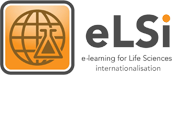eLSi is financially supported by the European Commission within the Leonardo da Vinci programme.
The Leonardo da Vinci programme aims to enhance the competitiveness of the European labour market by helping European citizens to acquire new skills, knowledge and qualifications and have them recognised across borders. It also supports innovations and improvements in vocational education and training systems and practices.
Leonardo da Vinci programme is part of the Lifelong Learning Programme 2007–2013 of the Education and Culture DG and is the European Union's programme for education and training.
The Leonardo da Vinci scheme funds several types of projects (“actions”) related to vocational education and training. These actions are: Mobility, Partnerships and Multilateral Projects. eLSi falls into the category of Multilateral Projects. These are larger-scale actions, with organisations from different countries working together to develop working practices in the vocational education and training sector.
Within the Multilateral Projects action, eLSi represents a "Transfer of innovation" project, which aims to improve the quality and attractiveness of Vocational Education and Training (VET) in the participating countries by transferring existing innovations to new legal, systemic, sector, linguistic, socio-cultural and geographic environments through working with transnational partners. Innovation transfer projects generate synergies by exploiting existing VET innovations (no "re-inventing the wheel").

